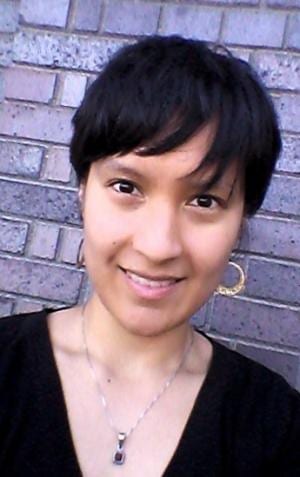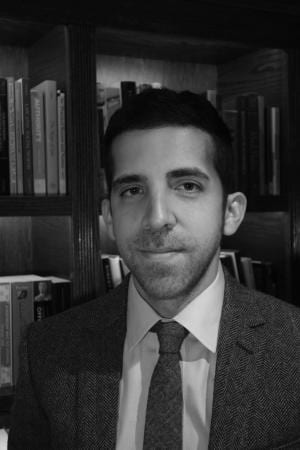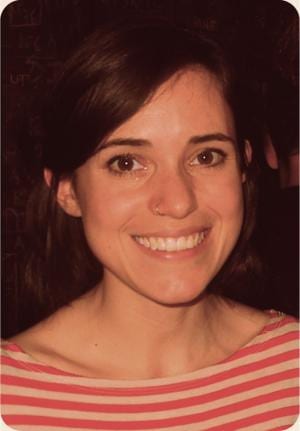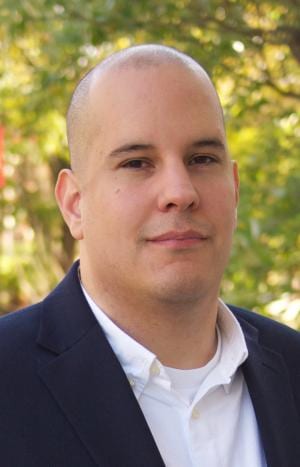2015 Provost’s Postdoctoral Fellows

Camille Avestruz
Faculty Mentor: Andrey Kravtsov. Department: Astronomy & Astrophysics
Camille Avestruz received her Ph.D. in Physics from Yale University in 2015 for her dissertation, “Modeling Galaxy Cluster Outskirts with Cosmological Simulations.” She graduated from Barnard College in 2009 with majors in Physics, Mathematics, and Dance. For her dissertation work, she used hydrodynamic cosmological simulations to model the evolution of galaxy clusters and developed a module to follow the growth of supermassive black holes and the effects of black holes in the intracluster medium. With simulations, she employed synthetic observations to study biases that could affect recent and ongoing measurements of the outer regions of galaxy clusters.
Camille has received a number of fellowships and awards in support of her research. She has received funding from the National Science Foundation Graduate Research Fellowship, the Fisk-Vanderbilt Dissertation Completion Award, the Social Science Research Council-Mellon Mays Foundation Graduate Studies Enhancement Grant, the D. Allan Bromley Fellowship, and the Paul K. and Evalyn Elizabeth Cook Richter Fellowship. Her dissertation work won the American Astronomical Society Beth Brown Memorial Prize and an honorable mention for the American Astronomical Society Rodger Doxsey Dissertation Prize.
Alongside her position as a Provost’s Postdoctoral Scholar, Camille will hold joint appointments as a Postdoctoral Fellow in both the Enrico Fermi Institute and the Kavli Institute for Cosmological Physics. At the University of Chicago, she will expand her research to explore how astrophysical processes affect observations of galaxy clusters and cosmological inference.

Edgar Garcia
Faculty Mentor: Frances Ferguson. Department: English Language & Literature
Edgar Garcia earned his Ph.D. in English Language and Literature from Yale University in 2015. Prior to entering the doctoral program, he earned a B.A. at University of California, Berkeley and an A.A. at Chaffey Community College. At Yale, he wrote a dissertation studying the circulation of indigenous cultural forms outside of traditional contexts in the twentieth century, focusing on instances where these forms helped writers rethink race, ethnicity, and nation. Titled “Deep Land: Hemispheric Modernisms and Indigenous Media,” his dissertation presented a deeper textual relationship between indigenous cultures and modernist practices than has been recognized so far. Instead of focusing solely on the oral culture traditionally attributed to indigenous peoples, it embraced a broad array of representational media including Ojibwe and Plains pictography, Mayan glyphs and maps, Nahuatl poetry, Zuñi, Laguna Pueblo, and Aztec migration sagas, and Mexican, Guatemalan, and Amazonian shamanic theatrics, in order to argue that American poets and novelists from Ezra Pound to Gloria Anzaldúa are indebted to these media for their poetic experiments. This work demonstrates that the appeal of indigenous cultural forms was their link to conceptions of ecological kinship, conceptions that gave rise to modern environmental communities alternative to national paradigms of belonging. With a methodology inspired by indigenous philosophies and cultural practices, this literary history interconnects the hemisphere in an alternative modernism defined by grassroots innovations and indigenous social networks. Edgar’s essays, poetry, and translations have appeared in such publications as The Antioch Review, Berkeley Poetry Review, Big Bridge, Damn The Caesars, Exit 9, Hydra Magazine, Jacket2, Los Angeles Review of Books, MAKE Literary Magazine, Mandorla, and Sous les Pavés. His essays have also appeared reprinted in The Time We Share (Yale University Press, 2015) and as introduction to Barbara Mor’s The Victory of Sex and Metal (The Oliver Arts and Open Press, 2015). Additionally, he helped complete a team-edited, web-and-print anthology, American Literature in the World, forthcoming from Columbia University Press. A book of his poetry, Boundary Loot/OHMAXAC, was published in 2012 by Punch Press. He also speaks regularly to educators across the nation on the subject of alternative pedagogies (especially for at-risk students) at the primary and secondary levels of education.
As a Provost’s Postdoctoral Scholar in the Department of English Language and Literature, Edgar looks forward to taking on a variety of scholarly, poetic, and educational endeavors. He is preparing a book manuscript that expands the scope of his dissertation to study how conceptions of ecological kinship inflect understandings of constituency outside of literary discourses, in anthropology, sociology, and legal studies. Alongside this scholarly manuscript, Edgar is also working on a long-form fictional ethnography on the subject of the anthropogenic climate crisis. Titled “Partial Animals: A Collection of Stories, Songs, Artifacts, Images, and Poems Documenting the Anthropogenic Climate Interference,” this work argues for the concept of human interference as a viable way to talk and think about the climate crisis. In autumn of 2015 Edgar will teach a course on ethnopoetics. In the following years, he will teach courses in hemispheric American literature, Latino and indigenous literatures, race and poetics, historical anthropology, and environmental criticism. In 2017 he will transition fully into his position at the University as the Neubauer Family Assistant Professor of English Language and Literature.

Adom Getachew
Faculty Mentor: Jennifer Pitts. Department: Political Science
Adom Getachew received her PhD in African-American studies and Political Science from Yale University in 2015. She holds a B.A. in African-American studies and Political Science from the University of Virginia. Her research interests are situated in the history of political thought, with specialized interests in international law, theories of empire and race, black political thought and post-colonial political theory. Her dissertation titled “The Rise and Fall of Self-Determination: Towards a History of Anti-Colonial World-Making,” excavates and reconstructs an account of self-determination offered in the political thought of Nnamdi Azikiwe, W.E.B Du Bois, Kwame Nkrumah, Eric Williams, Julius Nyerere and Michael Manley during the height of decolonization in the twentieth century. The dissertation illustrates that these anti-colonial critics, intellectuals and statesmen reinvented the concept of self-determination as a project of world-making in which they reconceived international political and economic relations. Although anti-colonial nationalism and self-determination are often characterized by the narrow goal of overcoming foreign rule in order to constitute nation-states, this study shows that Black Atlantic anti-colonialists developed a critique of international hierarchy and sought to create a post-imperial world order predicated on the principles of national autonomy and equality. Adom’s dissertation drew on archival research in Barbados, Ghana, Switzerland, Trinidad and the United Kingdom and was supported by the Ford Foundation, the Yale MacMillan Center for International and Area Studies, the Institute for Commonwealth Studies at the University of London, the Yale International Security Studies program and the Stuart Taylor Grant in the Department of African-American Studies.
In July 2016 Adom will begin a tenure-track position as a Neubauer Family Assistant Professor in the Department of Political Science.

John Lindo
Faculty Mentor: Anna Di Rienzo. Department: Human Genetics
John Lindo earned his Ph.D. in Biological Anthropology from the University of Illinois in 2015, where he was an Illinois Distinguished Fellow and focused on ancient DNA analysis. John’s dissertation, which was funded in part by an NSF grant, will be published as three articles, each exploring different aspects of Native American evolutionary history. The first examines the initial migration into the Americas, utilizing the genome of a 10,000 year old individual from Alaska. The second examines natural selection in the ancient environments of the Americas, and investigates the degree to which local adaptations may have contributed to Native American susceptibilities to European-borne pathogens. The third explores a major shift in genomic patterning, which occurred in Native Americans before and after European colonization. To produce this work, John engaged in second generation, genome-wide sequencing and incorporated contemporary advances in computational and statistical methods. John also has a forthcoming publication in the Oxford Handbook on Law and Technology on the limitations of genetic and racial inferences for the law.
During his time at the University of Chicago, John will assist in setting up an ancient DNA lab on the premises. He will extend his work on ancient DNA to incorporate a wider range of computational and statistical methods. He will also seek to place ancient genetic findings into a broader biological context by integrating functional work in molecular biology and foundational work in evolutionary theory. This work suggests that ancient genetic analysis should play a more central role in identifying adaptations (which are defined in causal-historical terms) in a broad range of biological contexts—from medicine to anthropology and the evolution of complex human traits.

Valeria Escauriaza López Fadul
Faculty Mentor: Mauricio Tenorio. Department: History
Valeria Escauriaza López Fadul is from Colombia. She will earn a Ph.D. in History from Princeton University in the summer of 2015 and holds a B.A. from Yale College. Her research interests include early modern Spanish and colonial Latin American intellectual and cultural history, philosophy of language, and history of science. Her dissertation, “Languages, Knowledge, and Empire in the Early Modern Iberian World (1492–1650),” reconstructs the beliefs and practices with which scholars, missionaries and crown officials confronted the challenge of governing a vast, multilingual and transoceanic empire. It shows that, rather than seeking to suppress native languages, Spanish scholars and administrators routinely approached the empire’s multiple tongues as rich archives of local knowledge. The Spanish Crown sponsored scientific expeditions, comprehensive censuses, local and universal histories, and the creation of libraries. It thereby attempted to harness linguistic knowledge at home and abroad for its own political benefit. López Fadul has a forthcoming chapter entitled “Language as Archive: Etymologies and the Ancient History of Spain,” in the volume Conversion and its Intellectual Consequences edited by Mercedes García Arenal (2015). She has received fellowships from the John Carter Brown Library and the Huntington Library. As a Provost’s Postdoctoral Scholar in the Department of History, she will revise her dissertation for publication.

Erin Pineda
Faculty Mentor: Patchen Markell. Department: Political Science
Erin Pineda received her PhD from the Department of Political Science at Yale University in 2015. Her research and teaching agenda investigates broad questions in the history of political thought about collective power, political action, democratic practice, social change, and the relationship between historical narratives and categories of political thought. Her dissertation, entitled “The Awful Roar: Civil Disobedience, Civil Rights, and the Politics of Creative Disorder,” studies protest and civil disobedience from the perspective of political action, attempting to restore democratic dignity to forms of strategic action marginalized by contemporary political theory. Arguing that the broad academic and popular consensus over civil disobedience is premised on a narrative of the US Civil Rights Movement in which black civility and white empathy trigger legal redress, the dissertation shows how the strategies activists used, and the responses they provoked, defy this narrative and thus challenge customary understandings of legitimate forms of protest. The standard account of civil disobedience requires that protestors submit to legal punishment, use persuasive rather than coercive means, and appeal to principles held in common by the majority in order to signal acceptance of the system’s legitimacy. In contrast, building on archival and historical research, the project contends that Civil Rights activists used mass jailing, civil disruption, and methods of crisis-generation to exercise novel forms of agency, disclose the nature of systemic injustices, dispute settled norms, and destabilize the bases of state legitimacy – engaging in “creative disorder.” Understanding these processes is important not only for civil rights history, but for rethinking the boundaries of protest and the place of disruption in democratic theory – and thus, in democratic societies.
Erin’s work has been published in History of the Present (Spring 2015) and The Appendix (September 2014), a quarterly journal of narrative and experimental history, and has been funded by the Beinecke Rare Books & Manuscripts Library, the George M. Darr Memorial Fellowship, and a Yale University Dissertation Fellowship. Erin holds a Bachelors degree from Barnard College at Columbia University (summa cum laude, 2006), and a Masters degree in Political Science from Yale (2011). During her time as a Provost’s Postdoctoral Scholar in the Department of Political Science, Erin will prepare a book manuscript based on her doctoral work and begin a new project that investigates the distinct temporalities of progress, stasis, and change embedded within institutional articulations and normative defenses of democracy.

Michael Rodríguez-Muñiz
Faculty Mentor: Andreas Glaeser. Department: Sociology
Michael Rodríguez-Muñiz was born and raised in the Northwest side of Chicago, where he later became a community organizer in the Humboldt Park area. In 2003, Michael completed his baccalaureate degree in Political Science from Northeastern Illinois University, and in 2008 received a Master’s degree in Sociology from the University of Illinois-Chicago. He recently completed his PhD in Sociology at Brown University. His research interests include the sociology of knowledge and culture, race and ethnicity, political sociology, science and technology studies, and ethnographic and qualitative methodologies. His dissertation, entitled Temporal Politics of the Future: National Latino Civil Rights Advocacy, Demographic Knowledge, and the “Browning” of America, investigates the politicized and affectively charged construction, circulation, and consumption of demographic projections and narratives. With a focus on national Latino spokespersons and leaders, this project offers a timely case study of how ethnoracial futures—often treated as immutable and inevitable—are being brought to bear on the political present. A chapter of his dissertation received the 2014 Cristina Maria Riegos Graduate Student Paper Award from the American Sociological Association’s Section on the Sociology of Latinas/os.
Michael has previously published a chapter on Latino/a identity formation and social movements in the edited volume, ¡Marcha!: Latino Chicago and the Immigrant Rights Movement (University of Illinois Press, 2010). He also co-edited a special issue of Qualitative Sociology on Actor-Network Theory and recently published an article in the American Journal of Cultural Sociology on the ontological inheritances and myopias of contemporary poverty knowledge. He is a recipient of a Ford Foundation Predoctoral Fellowship and a Dissertation Improvement Grant from the National Science Foundation, along with several internal fellowships at Brown University.
As a University of Chicago Provost’s Postdoctoral Scholar, Michael plans to transform his dissertation into a book manuscript for an academic press and begin his next research project on internal colonialism and critical theories of racial domination.
